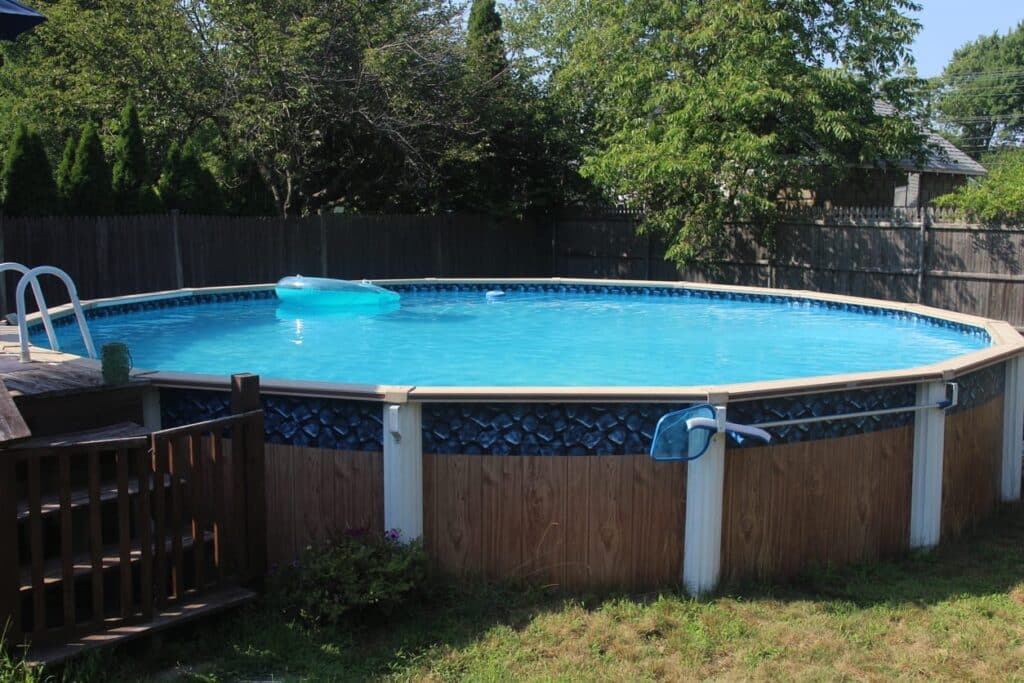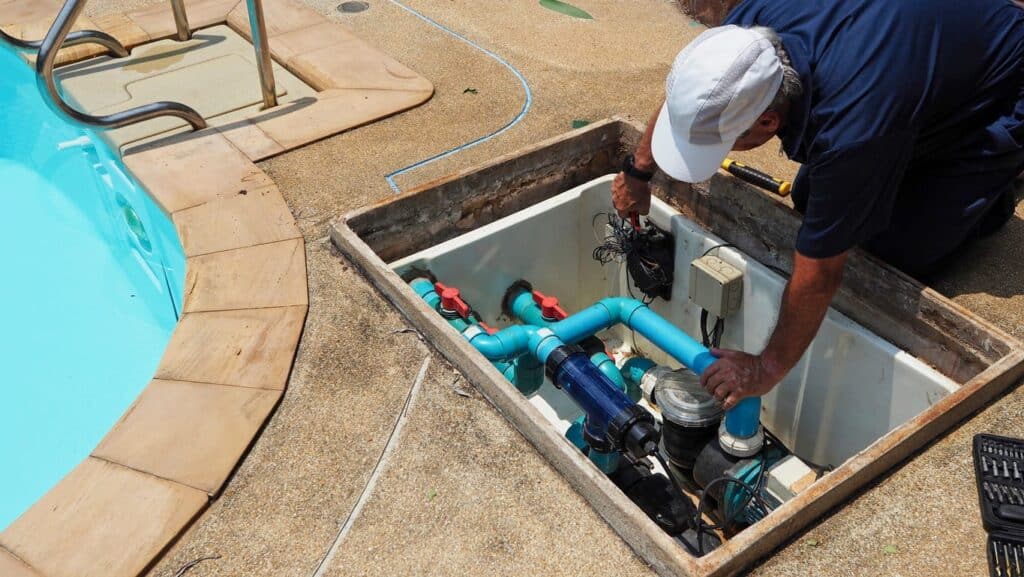In the heart of Las Vegas, where the summer sun is a constant companion, your swimming pool is more than just an amenity — it’s an oasis.
However, if you’ve noticed the water level in your pool is dropping faster than usual, you might be dealing with more than just evaporation. Could it be a pool leak?

If you need help identifying if your pool is leaking, let Larkin Plumbing provide some helpful tips for spotting the signs of a faulty pipe. This is important because the longer you wait, the more damage will be done to your pool and the surrounding area.
So here are a few ways to detect if your pool has a leak and what you can do about it.
Signs of a Pool Leak
Watch out for these signs to stay on top of your pool’s maintenance:
Excessive Water Loss
Excessive water loss in a home pool can be a significant concern as it could indicate a leak. Key signs of excessive water loss include:
- A rapid decrease in the pool’s water level, more than the usual evaporation rate (about 1/4 inch per day)
- The constant need for refilling the pool
- Increased water bills
Noticing and addressing these signs promptly can prevent further damage to your pool and property.
If you suspect excessive water loss, consider conducting a simple bucket test or contact a professional pool leak detection service.
Test Water Levels With the Bucket Test
The bucket test can test for water loss in your pool. Here’s how you do it:
- Fill a bucket: Fill a plastic bucket 3/4 full of pool water
- Mark the water level: Using a marker, draw a line on the inside of the bucket at the water level. Do the same on the outside, marking the pool’s water level.
- Wait 24 hours: Place the bucket on a pool step (where it won’t be tipped over). After 24 hours, compare the two water levels.
- Evaluate: If the pool water level has decreased more than the water level inside the bucket, your pool may have a leak
Remember, some water loss will occur due to evaporation, but excessive water loss indicates a problem. If you suspect a leak, contact a professional such as Larkin Plumbing for further investigation.
Chemical Imbalances
Chemical imbalances in your pool can be a significant sign of a leak. When a pool is leaking, it can cause fluctuations in the pH levels, leading to an imbalance in the water chemistry.
This can result in various issues, such as increased algae growth and water discoloration, which are clear indicators of a possible leak.
Make sure to regularly test and adjust the water chemistry levels of your pool to ensure they remain balanced.
Related: How to Find a Pool Leak
Wet or Damp Ground
If you’re noticing wet or damp ground in the area around your pool, it might be a sign of a leak. Water can escape from a pool due to cracks in the pool shell, faulty plumbing, or even from a malfunctioning pump.
This escaping water can saturate the surrounding soil, leading to persistently wet or damp patches of ground.
Not only does the wet or flooding ground help you detect a pool leak, but it also lets you know where the water is flowing and where to focus your repair efforts.
Where Do Pools Usually Leak?
Pool Structure
Leaks can occur in the pool’s structure due to cracks or damage in the pool’s surface, liner, or shell.
Minor check or shrinkage cracks on steps in concrete pools usually don’t cause leaks. However, larger and deeper cracks may lead to leakage and should be tested with dye for confirmation.
Smaller cracks can be addressed using pool putty, silicone, or a plaster mixture.
Extensive cracks that span the pool or walls require a comprehensive repair approach involving an injected sealant for initial sealing, followed by a final plaster mix layer.
Pool Equipment
Inspecting the equipment pad for leaks is also an important step. If there’s a faulty seal or a malfunctioning component, it might result in water seeping into the equipment pad.
Although the leak may not be immediately noticeable, frequent checks over several days can help identify any issues.
Common parts of your pool equipment that may leak include:
- Pool pumps
- Valves
- Filters
- Heaters
It’s crucial to exercise caution during these inspections to avoid potential electrical shocks from damp wires. If you’re uncomfortable performing this task yourself, do a good amount of research or reach out to a professional for help.
Pipes and Joints
Pool pipe and joint leaks are common and can be caused by:
- Corrosion, damaging the pool’s underground plumbing
- Ground movements like settling or natural shifts that can harm the plumbing or puncture the pool floor
- Problems with pool fittings such as main drain pipes, return lines, and skimmer fittings
- Pool pump issues like a low water level, a cracked pump strainer lid, or damaged pipes
- Dry, displaced, or damaged lid gaskets, not just pipe fittings or main seals
- Settling of the system itself leading to plumbing leaks
- Poorly fitted pipes with lips and gaps that allow water to escape
Regardless of the cause, it’s crucial to promptly address pipe and joint issues before they advance and become pricey.
Maintain a Leak-Free Pool with Larkin Plumbing
Looking for the best pool leak detection in Las Vegas? Larkin Plumbing is the solution to your problem. We take great pride in providing our customers with the best service, inspections, and repairs possible.
So, learn more about us and what we can do to keep your pool functioning flawlessly.


